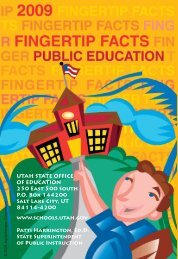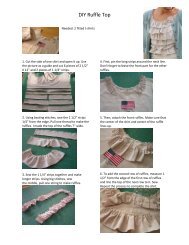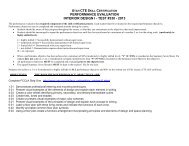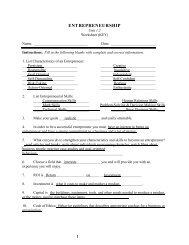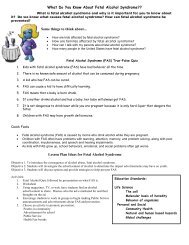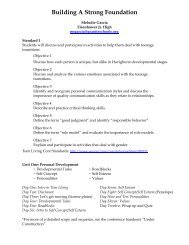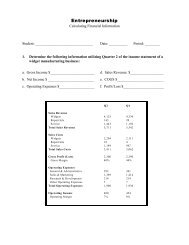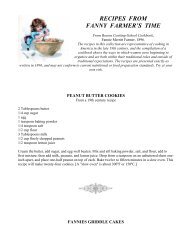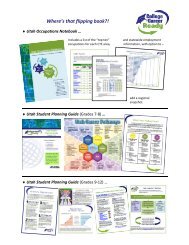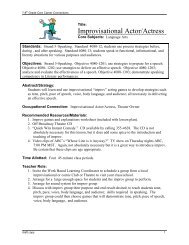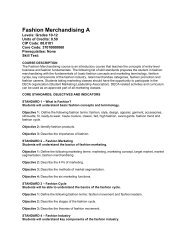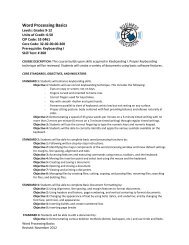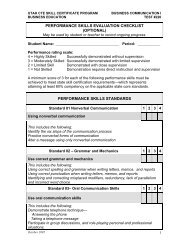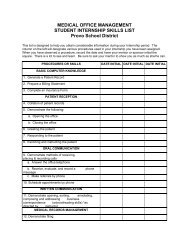Script Writer
Script Writer
Script Writer
You also want an ePaper? Increase the reach of your titles
YUMPU automatically turns print PDFs into web optimized ePapers that Google loves.
7-8 th Grade Core Career Connections<br />
Title:<br />
<strong>Script</strong> <strong>Writer</strong><br />
Core Subjects: Theatre<br />
Standards and Objectives: Theatre Standard I : <strong>Script</strong> Writing, Objective A: Unity, B:<br />
Character, C: Plot; Standard II: Objective D: Characterization; Standard IV: Directing, Objective<br />
A: Vision; Standard V: Objective A: Researching, B: Comparing and integrating art forms (role<br />
of scriptwriter), C: Analyzing and Critiquing, F: Assessing.<br />
Abstract/Objective:<br />
The students will work in small groups to write spoofs on legends, fables, or folktales. They<br />
will read them to the class. They will assess each other’s work and offer suggestions for<br />
improvement. They will then work on improving the script and adding action. As a<br />
culminating experience, they will perform them for the class.<br />
Occupational Connection: <strong>Script</strong>writer, artistic director<br />
Recommended Resources/Materials:<br />
1. A chalkboard and chalk<br />
2. Paper and pencils for each student<br />
3. Costumes (optional). Examples (written and/or on video) of spoofs.<br />
Time Allotted: Eleven 50-minute class periods.<br />
Teacher Role:<br />
Invite your Work-Based Learning Coordinator to invite an Artistic Director or a <strong>Script</strong>writer<br />
to visit your classroom. Contact the Community Partner and explain what you would like<br />
them to do when they visit your classroom. If one is not available, collect the information<br />
needed to relay to your students. Collect the materials listed above. Find good examples of<br />
spoofs to read and/or show on Video to your students. Have a good example of proper script<br />
form to show your students (see fourth class).<br />
Activity:<br />
First Class:<br />
1. Explain to the students what a spoof is (closely imitating a story for comic effect; making<br />
good-natured fun of the story). Ask them to brainstorm where the spoofs they have seen<br />
originated. (Examples: Austin Powers from James Bond, Spaceballs from Star Wars)<br />
Read and/or show video clips of spoofs (see literary connections).<br />
2. Tell them that they will be writing their own original spoofs based on legends, fables, and<br />
folktales. (Part of the 7 th and 8 th grade reading curriculum includes these. You may want<br />
to contact your reading teachers for lists of legends, fables, and folktales the students<br />
should be familiar with.) Have them brainstorm and record on the board (and on paper) a<br />
list of legends, fables, and folktales.<br />
3. Briefly review the story line for each listed.<br />
draft copy 1
7-8 th Grade Core Career Connections<br />
4. Tell them that tomorrow a professional scriptwriter will visit the class and help them learn<br />
more about script writing and how to create a spoof.<br />
Second Class: WBL Connection - If possible invite a <strong>Script</strong>writer<br />
1. If possible invite a <strong>Script</strong>writer to explain what they do as an Artistic Director (Chooses<br />
scripts to produce, writes and develops scripts, collaborates with costume designers and<br />
set directors, hires actors, coordinates schedules, organizes the budget, etc.) or<br />
<strong>Script</strong>writer (research, writing, collaborating with actors and directors, etc.).<br />
2. The Community Partner could also give examples and brief descriptions of spoofs they<br />
have written or produced.<br />
3. They will review the progression of a play or movie story-line (Introduce characters, then<br />
an incident occurs that creates a conflict or obstacle, then something else happens to<br />
further complicate things, many times a love story develops, then the conflict is<br />
resolved.)<br />
4. The <strong>Writer</strong> will then choose one of the most well known legends, fables, or folktales from<br />
the student’s list. He or she will then involve the students in creating a spoof based on<br />
that story. (Briefly review what happens in the original story; List the important<br />
characters and the traits each of them has. Give them hints for creating humor, such as:<br />
exaggerate or use opposite character traits or events, do something totally unexpected,<br />
use puns, relate it to modern times, change genders, etc.)<br />
5. The Community Partner will then write the outline for an original spoof of the story they<br />
have chosen, integrating the students’ input, and explaining throughout the process the<br />
‘why’ and the ‘how’ of what they are doing. If there is time have some student<br />
volunteers (and perhaps the writer) improvise the play for the class to observe. If this is<br />
not possible then explain the information above.<br />
Third Class:<br />
1. Review with the students what they learned the day before. Explain the Outline they will<br />
be using (see sample attached). Divide the class into 6 or 7 groups of four or five<br />
students. Each group is to choose a story from their list to spoof. Make sure there are no<br />
duplications. Encourage creativity and the use of improvisation.<br />
Fourth Class:<br />
1. Review proper script form. Show several examples, pointing out the various elements of a<br />
script and how they are organized. (Title, setting description, list of characters with a<br />
brief description of each, bold capitalized NAMES of characters before their dialogue,<br />
with actions in parenthesis.)<br />
2. Give them a checklist to refer to in order to write well (see attached Checklist).<br />
3. Give them time to improvise and write their original script.<br />
Fifth Class:<br />
Give them more time to work on their scripts. Let them know that they will be reading their<br />
scripts to the rest of the class tomorrow.<br />
draft copy 2
7-8 th Grade Core Career Connections<br />
Sixth and Seventh Class:<br />
Each group reads their scripts to the class (or have the groups team up to read to each other).<br />
After each, their classmates verbally critique their piece using the Checklist provided as a<br />
base for assessment. Suggestions for improvement are offered (by class members as well<br />
as by the teacher).<br />
Eighth and Ninth Class: Each group works on memorizing and staging their piece.<br />
(Costumes are optional).<br />
Tenth and Eleventh Class:<br />
Each group performs their spoof for the class. Allow time for verbal critiques.<br />
Possible Extensions:<br />
1. You may want to hold a secret vote to decide which one (or two) of the original spoofs<br />
will be performed, as part of a lecture demonstration for other classes that will be invited<br />
to attend.<br />
2. Arrange a field trip to a local theater or community playhouse such as the Off Broadway<br />
Theater or Desert Star Playhouse (see Work-Based Learning Resources).<br />
Suggested Assessment:<br />
Teacher and student oral evaluations after each reading, using the “Checklist” as a guide.<br />
Work-based Learning, Community Connection:<br />
The Community Partner will visit the class, prepared to discuss their job (specifically<br />
scriptwriting). They will give examples of plays they have written. They will give hints for<br />
writing a good play, specifically a SPOOF. They will involve the students in writing an<br />
outline for an original spoof using a legend, fable, or folktale as a base. If there is time they<br />
will improvise the spoof with some student volunteers.<br />
<strong>Writer</strong>s and Artistic Directors for Utah Regional and University Theaters: Lighthouse<br />
Theater: 801-274-9404, City Rep Family Theater: 801-532-6000, Draper Historic Theater:<br />
801-572-4611, Hale Centre Theatre: 801-984-9000, Off Broadway Theater: 801-355-4628,<br />
Stage Right Theater Company: 801-485-8038.<br />
Desert Star Playhouse 801-266-7600<br />
Integrative Connection:<br />
Language Arts: 4080-0103: Activate and build on prior knowledge of content, 4080-0603:<br />
Listening (synthesizing information), 4080-0703: interpreting literary materials, 4080-0802:<br />
Viewing critically, 4080-0803; Offering feedback, 4080-10: process strategies for writing,<br />
4080-11: writing a text for an audience, 4080-12: process strategies for speaking before an<br />
audience.<br />
draft copy 3
7-8 th Grade Core Career Connections<br />
Literary Connections:<br />
Spoofs: The Stinky Cheese Man and Knights of the Kitchen Table by Jon Scieszka,<br />
Politically Correct Bedtime Stories by James Finn Garner; Fables, Legends, and Folktales:<br />
Elements of Literature (part of the 7 th and 8 th grade reading curriculum), Purpose in<br />
Literature<br />
Internet Connections: links for the above: http://www.amazon.com.<br />
draft copy 4
7-8 th Grade Core Career Connections<br />
Original Spoof Outline<br />
Names __________________________________________________ Per. ____<br />
1. Briefly describe the original tale.<br />
2. Describe the characters and their individual traits.<br />
3. What tools will you use to create humor in your Spoof of the tale?<br />
(Examples: use of exaggeration, opposites, the unexpected, changing the era or the setting<br />
or gender roles, use of puns, etc.)<br />
4. On the back of this page write a detailed outline of what will happen in your Spoof<br />
(include how you will introduce the characters, what happens to create conflict or obstacle,<br />
what will complicate the plot, and how the conflict is resolved). Note: Your playing time<br />
should be ten to fifteen minutes. Remember that there will be no inappropriate actions or<br />
language allowed.<br />
draft copy 5
7-8 th Grade Core Career Connections<br />
<strong>Script</strong> Assessment Checklist<br />
Names___________________________________________ Period ____<br />
2 pts. = YES, 1 pt. = To some degree, 0 = NO (Circle points earned and add helpful<br />
comments.) Total points earned = ______ (out of 22 points possible)<br />
1. Is it CONCISE? Remember: “Less is MORE”.<br />
2 1 0<br />
2. Does the dialogue tell you something about the characters?<br />
2 1 0<br />
3. Do they quickly get to the INCIDENT or COMPLICATION?<br />
2 1 0<br />
4. Do they quickly get to the JOKE?<br />
2 1 0<br />
5. Are the characters well developed; do they add to the play?<br />
2 1 0<br />
6. Is the plot interesting?<br />
2 1 0<br />
7. Is it creative and original?<br />
2 1 0<br />
8. Is it FUNNY?<br />
2 1 0<br />
9. Does it have a good ENDING?<br />
2 1 0<br />
10. Did it fit within the ten to fifteen minute time allotment?<br />
2 1 0<br />
11. Was a proper script FORMAT used?<br />
2 1 0<br />
draft copy 6



